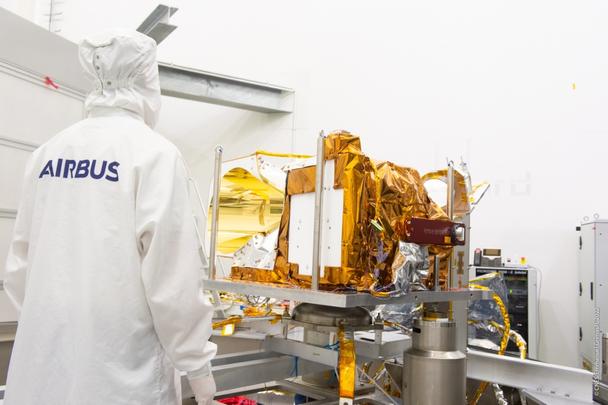Airbus delivers MicroCarb instrument, the first European mission to measure atmospheric CO2

A special passenger crossed under the Channel this week: the MicroCarb instrument, en-route to be integrated with its satellite platform at RAL Space (Rutherford Appleton Laboratory) in Oxfordshire, England.
MicroCarb is a small satellite designed to map sources and sinks of carbon dioxide (CO2)—the most important greenhouse gas — on a global scale, to better understand the impact of CO2 produced by human activity and how this greenhouse gas is released and absorbed.
A French initiative in the frame of the Paris agreement on climate and the COP21, MicroCarb is the first European project to measure CO2 globally. The mission will complement the American and Asian on-going missions and is a precursor for future Copernicus missions such as CO2M.
CNES selected Airbus to develop and build the payload: the MicroCarb instrument, based on a passive spectrometer.
During its five year long mission from its Sun-synchronous orbit, 650km above the Earth, the 190kg satellite will measure the carbon dioxide concentration in the atmosphere to better understand the flows between carbon sources and sinks, the carbon cycle of our planet, and improve weather forecasts.
Its dispersive spectrometer instrument will be able to measure atmospheric concentration of CO2 globally with a high degree of precision (on the order of 1 ppm) and with a pixel size of 4.5 km x 9 km.
The payload, designed and produced by Airbus, will be flown on a microsatellite built around CNES’s Myriade spacecraft bus and assembled and tested at RAL Space (Rutherford Appleton Laboratory) facilities by Thales Alenia Space, on behalf of UKSA, who partnered with the French Space agency.
The instrument, by analyzing the sunlight reflected by Earth, will track the modifications of the solar rays induced by the various molecules met by the photons while passing through the atmosphere. By focusing on the known and precise wavelengths specific to carbon and methane molecules, it is able to identify their presence and measure their concentrations across the globe.
This mission involves the French scientific community studying climatology and the carbon cycle. The MicroCarb mission includes funding from French Investments for the Future Programmes, as well as from the European Union framework programme for Research and Innovation, Horizon 2020.
Your contact
Ralph Heinrich
Head of External Communications - Airbus Space Systems
Jeremy Close
External Communications - Airbus Space Systems, UK
Guilhem Boltz
External Communications - Airbus Space Systems, France
Francisco Lechón
External Communications - Airbus Space Systems, Spain